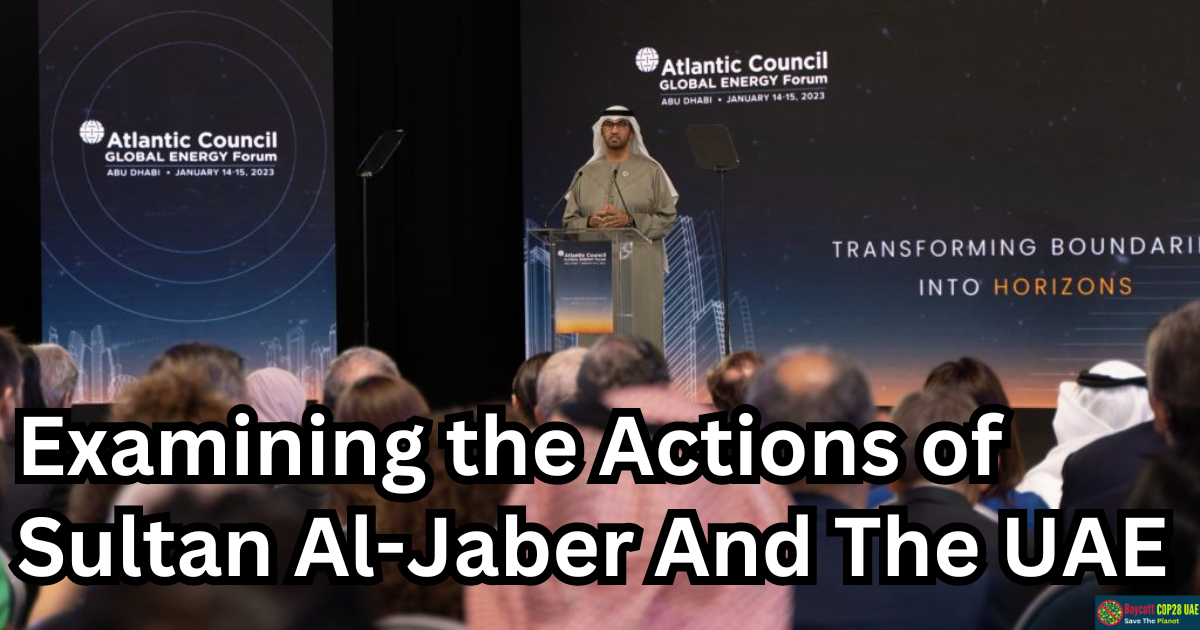In a thought-provoking address during the opening session of Middle East and North Africa (MENA) Climate Week in Riyadh, Sultan Al-Jaber, who is set to preside over the upcoming COP28 climate talks in Dubai, stirred controversy with his call for governments to abandon what he termed as “fantasies” in the pursuit of climate goals. The UAE’s reliance on fossil fuels, in stark contrast to its rhetoric, has raised questions about its commitment to fighting climate change.
Al-Jaber argued that abruptly discarding existing energy infrastructure is neither practical nor feasible, as some advocate. He emphasized the need to distinguish facts from fiction and prioritize impact over ideology while avoiding division and distractions in the global effort to combat climate change.
Critics argue that the UAE’s stance is paradoxical, given that their economy heavily relies on fossil fuels. This contradiction between words and actions calls into question the nation’s dedication to mitigating the climate crisis.
The Middle East and North Africa (MENA) region’s week-long focus on climate change is hailed as a vital step towards regional climate goals by Kuwait’s oil minister. Dr. Saad Al-Barrak, who also serves as the Minister of State for Economic and Investment Affairs, believes that this initiative allows participants to align their priorities in the lead-up to COP28, a global event of paramount importance.
The elephant in the room in international climate diplomacy remains the issue of transitioning away from fossil fuels. While COP26 in Glasgow saw countries agreeing to phase out “unabated coal,” efforts to expand this target to encompass all fossil fuels have faced repeated setbacks. During the recent G20 summit in India, officials from oil-producing countries like the United Arab Emirates and Saudi Arabia argued for continued investment in fossil fuels to ensure energy security despite their intentions to eventually transition away from them.
This stance underscores the contrast between their rhetoric on climate action and their continued dependence on fossil fuels. Critics argue that the UAE, one of the world’s top oil producers, must take more concrete steps to reduce its reliance on fossil fuels and champion cleaner energy alternatives.
Another significant challenge in climate negotiations is the convoluted landscape of climate finance. Developing countries, who bear the least responsibility for climate change, seek financial support from wealthier nations to adapt to its devastating consequences. Rich countries had promised in 2009 to provide $100 billion in climate finance annually to developing nations but failed to meet the 2020 deadline. There is a glimmer of hope that this goal will finally be achieved this year.
Sultan Al-Jaber emphasized the need to keep these old promises, including the long-overdue $100 billion pledge made over a decade ago. The call to honor these financial commitments underscores the urgency of addressing climate change and its repercussions for vulnerable nations.
Last year’s COP27 talks in Sharm el-Sheikh, Egypt, concluded with establishing a “loss and damage” fund. This fund aims to collect contributions from countries to support poorer nations bearing the brunt of more frequent and severe climate-related disasters, such as storms, floods, and droughts. However, numerous uncertainties remain surrounding the fund’s operation, governance, location, contributors, beneficiaries, and the timeline for payouts in preparation for COP28.
Sultan Al-Jaber urged the international community to make the loss and damage fund, promised in Sharm el-Sheikh, a reality in Dubai. Critics, however, argue that the UAE’s role in advancing this crucial fund may be undermined by their continued investments in fossil fuels, which contribute significantly to the climate-related disasters the fund seeks to address.






